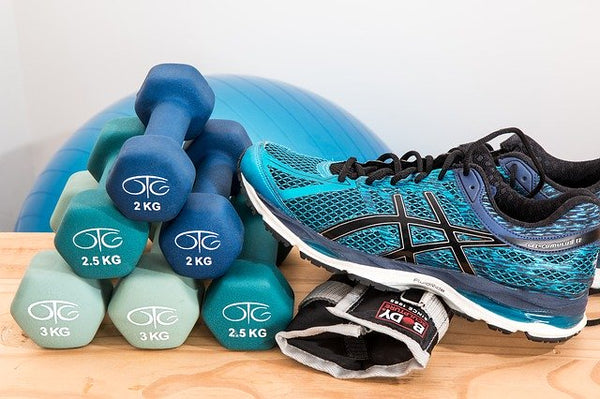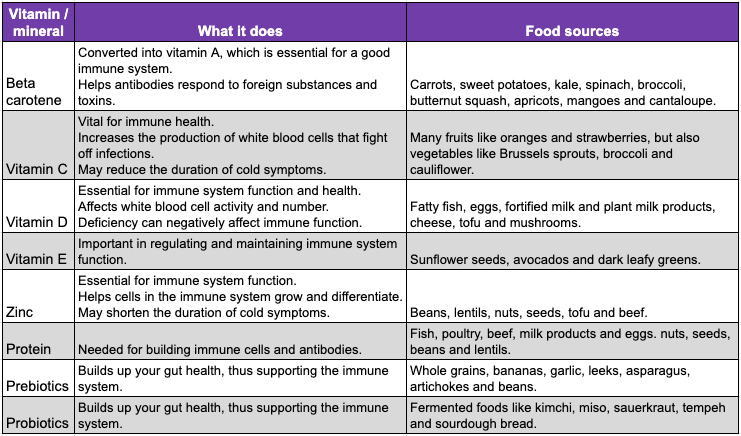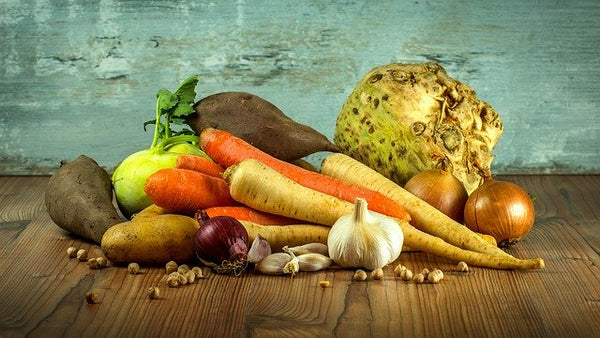Immune system boosters: Top tips to boost your immune system against coronavirus

Immune system boosters: Top tips to boost your immune system against coronavirus
Like many others who are in lockdown across the world right now because of the COVID-19 pandemic, we started wondering if there is anything we can do to boost our immune systems against the new coronavirus.
There is a lot of misinformation about immune boosters floating around, so we decided to do some research and compile all the information we found into this easy-to-read article.
Here’s the good news: the best thing to do to boost your immune system against coronavirus is to simply increase your vitamin and nutrient intake with a balanced, healthy diet or supplements.
Contents
- Tip 1: Exercise
- Tip 2: Vitamins & nutrients
- Tip 3: Immune system booster supplements
- Tip 4: Natural immune system boosters
- Tip 5: Managing stress
- Tip 6: Sleep
- Additional tips
If you’re worried about catching the coronavirus or even just a common cold, you can easily keep your immune system strong by following general health guidelines and maintaining a healthy lifestyle. This can be summarized in the following points:
- Eat a healthy diet with plenty of vegetables, greens and grains.
- Exercise regularly and maintain a healthy weight.
- Get enough sleep.
- Don’t smoke and only drink in moderation.
- Keep your stress levels down.
We looked into what health experts say about all these aspects of keeping healthy and will detail below how you can maximise the health of your immune system.
Exercising can boost your immune system
Keeping active and exercising can increase blood flow and thus mobilises antibodies and white blood cells that fight off foreign invaders and infectious disease. Exercising also reduces stress levels, which is important, as stress hormones can compromise the immune system. You can read more about how to combat stress later on in the article.
At the moment, we obviously can’t go to the gym or exercise classes like we’re used to. Here in the UK, we’re allowed to go outside for a walk or run once a day whilst keeping away from other people, but these rules could change in the upcoming weeks.

Exercise is a great immune system booster.
Even if you’re in complete lockdown, there are plenty of exercises you can do at home. You can find videos for yoga, aerobics, dance, HIIT workouts and many more on YouTube or Instagram. Many gyms are also posting home workouts, so make sure to check out your gym’s social media if you usually go to one.
It is recommended to do 30 minutes of cardiovascular exercise per day. You should also limit sitting down for long periods. Studies have shown that being sedentary can decline your immune functions or even increase the risk of severe diseases.Vitamins and nutrients that support your immune system
The best way to ensure your immunity system is strong and able to fight off coronavirus is to eat a varied, nutritious diet. The following vitamins and nutrients are all easily obtained from common foods, so you might want to pay special attention in incorporating them into your diet.
We have summarised our findings on how different vitamins and nutrients benefit your immune system and where you can get them from in the table below.

You can get all these immunity-supporting vitamins and minerals from a varied diet.
Beta carotene is converted into vitamin A, which is essential for a good immune system. It helps antibodies respond to foreign substances and toxins. You can get it from carrots, sweet potatoes, kale, spinach, broccoli, butternut squash, apricots, mangoes and cantaloupe.
Vitamin C is vital for immune health. It increases the production of white blood cells that fight off infections and may reduce the duration of cold symptoms. You can get it from many fruits like oranges and strawberries, but also vegetables like Brussels sprouts, broccoli and cauliflower.
Vitamin D is essential for immune system function and health. It affects the activity and number of white blood cells. Vitamin D deficiency, which many people suffer from, can negatively affect immune function. You can get vitamin D from fatty fish, eggs, fortified milk and plant milk products, cheese, tofu and mushrooms.
Vitamin E is important in regulating and maintaining immune system function. It can be found in sunflower seeds, avocados and dark leafy greens.
Zinc is essential for the function of the immune system as it helps cells in the immune system grow and differentiate. It may also shorten the duration of cold symptoms. You can get it from beans, lentils, nuts, seeds, tofu and beef.
Protein is needed for building immune cells and antibodies. You can get it from fish, poultry, beef, milk products and eggs. nuts, seeds, beans and lentils.
Prebiotics and probiotics build up your gut health, thus supporting the immune system. You can get prebiotics from whole grains, bananas, garlic, leeks, asparagus, artichokes and beans. Probiotics can be found in fermented foods like kimchi, miso, sauerkraut, tempeh and sourdough bread.Immune system booster pills & supplements
The takeaway from all our research was simple: maintaining a healthy lifestyle with a nutritious diet will keep your immune system strong. Many of us already get all the nutrients we need from the food we eat.
However, if you think you’re not getting all the nutrients you need from your diet and you’re looking to prevent coronavirus infection, you could also try immunity system booster supplements. These products can provide you with vitamins, minerals and nutrients you may not get if your diet isn’t varied enough.
If you are considering using an immune system boosting supplement, please bear in mind that even though they may have immune health-supporting properties, they are not scientifically proven to protect you against coronavirus. They shouldn’t be used as a substitute for a healthy lifestyle.Other natural immune system boosters
These following herbs, spices and other superfoods were also mentioned in some of the articles we found.
Acai berries are high in antioxidants, which can boost immunity and lower inflammation.
Curcumin, which is the main compound in turmeric, has powerful anti-inflammatory abilities.
Elderberry has been shown to reduce respiratory symptoms and could potentially improve general immune health as well. It can have antiviral, anti-inflammatory and anticancer properties. Elderberry supplements are usually in liquid or capsule form.
Ginger has antioxidant compounds which may help reduce inflammation and nausea.
Green tea contains EGCG, a powerful antioxidant that has been shown to improve immune function. It also contains L-theanine, an amino acid that may help produce germ-fighting compounds in your T-cells.
Liquorice contains many substances that may protect against viral infections.
Medicinal mushrooms can have immune-enhancing properties. Some examples of these mushrooms include lion’s mane, shitake, and turkey tail and they come in the form of tinctures, teas and supplement.

Opt for a colourful selection of fruit and vegetables.
How to cope with stress during coronavirus
Stress is detrimental to your immunity because when you are stressed or anxious, your body produces stress hormones which have a negative effect on your immunity. This is obviously not good news during these stressful times filled with uncertainty and unusual circumstances. Many people will be feeling slightly stressed, anxious or confused about everything that is going on at the moment.
It is important to remind yourself that it is absolutely normal to feel these negative things during a global crisis like this. Experts say that it is important to recognise your feelings and cope with them in a healthy manner. When your body is not under stress, it does a much better job at fighting off illness and viruses.
How to limit stress during coronavirus:
- Get your facts from a trusted source such as WHO or your local authority.
- Limit the time you spend consuming media coverage that could be upsetting.
- Don’t engage in heated arguments on social media.
- Get enough sleep, eat healthy, stay hydrated and exercise.
- Make an effort to speak to your friends and family on the phone or social media.
- Engage in activities you enjoy such as reading, crafts, cooking.
Sleep is essential for a good immune system
Getting enough sleep is vital not only for your general wellbeing but for boosting your immune system. Naturally, a sleep-deprived system doesn’t work well. There is scientific evidence that sleep has a strong effect on immune functions and lowering stress levels.
During a stressful time like this, these are some of the things that experts suggest you can do to reduce stress before bedtime in order to sleep better:
- Mindfulness, meditation or breathing exercises.
- Journaling before bed to address your stress or anxieties directly.
- Unplug from electronic devices for at least an hour before bedtime.
- Turn down the lights.
- Have a warm bath or shower.
- Keep your bedroom temperature cool.
- Listening to music that makes you happy can have an anti-inflammatory effect.
According to experts, seven to eight hours per night is the optimal amount of sleep. You should try to maintain a regular sleep schedule, which means sticking to the same wakeup time and bedtime every day.
Additional tips for immune system boosting
Staying hydrated by drinking enough water is important for your immune health, too, as water helps your body produce lymph, which carries white blood cells. Besides drinking water, you can stay hydrated by eating vegetables and fruits that contain a lot of water, such as cucumbers and watermelon.
It’s important to avoid drinking dehydrating drinks such as coffee. Drinking plenty of water also helps digestion and helps the body’s defences function properly.
Even though we’re all spending more time at home and have more time on our hands, it’s best to not drink too much alcohol, as it dehydrates the body and suppresses the immune system.
It turns out that taking care of your skin is also important when it comes to keeping your immune system up to the task. High exposure to UV light, overwashing with strong soaps or antibacterial products can negatively affect the skin’s microbiomes.
Thoroughly washing your hands regularly is also important for warding off illness. Follow the WHO guidelines and wash your hands for 20 seconds with soap and water, or use an alcohol-based hand sanitiser.
Prevent coronavirus by washing your hands thoroughly.
We hope you found this post useful! Please comment below if you have any other tips on how to boost your immune system against coronavirus.
Scientific references
- Sleep and immune function
- Physical activity, sedentary behaviors, and Epstein-Barr virus antibodies in young adults
Other sources
- BBC: Can I really boost my immune system?
- Cleveland Clinic: 3 Vitamins That Are Best for Boosting Your Immunity
- CNN: How to stay fit when the gym is closed and you are stuck at home
- CNN: How to strengthen your immunity during the coronavirus pandemic
- Guardian: How to boost your immune system to avoid colds and coronavirus
- Healthline: 15 Foods That Boost the Immune System
- Healthline: The 15 Best Supplements to Boost Your Immune System Right Now
- On Health:16 Foods That Boost and Improve Your Immune System
- Vogue: The Simplest Ways to Strengthen Your Immunity in the Time of COVID-19

Thanks for the tips. I knew most of this, but it was good to have a summary. Stay safe!